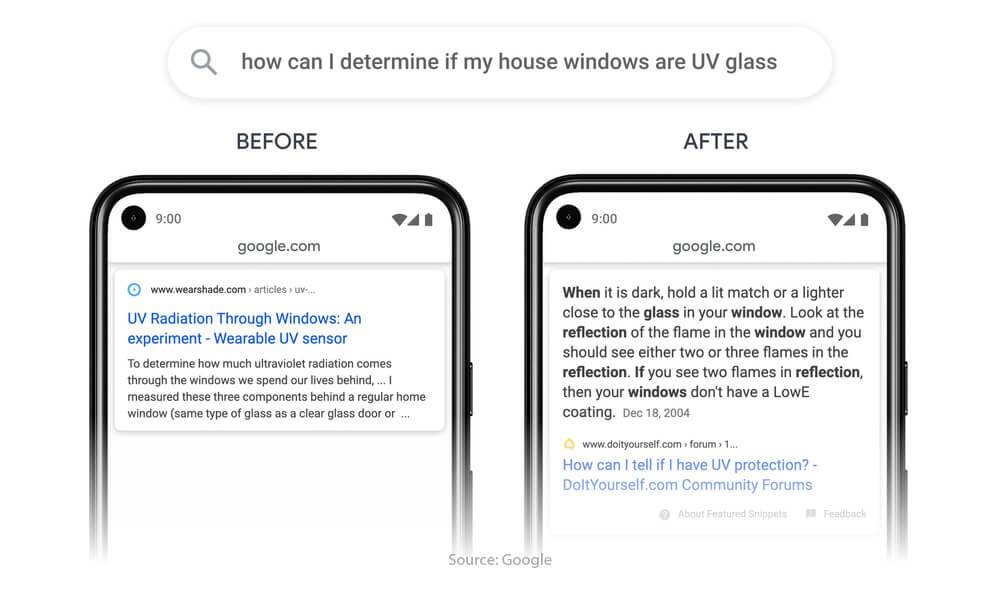Google Passages: What Google’s New Algorithm Update Means for Search Engine Optimization (SEO)
Google is about to give its ranking algorithm a makeover. During an October 2020 livestream, the company revealed a series of new algorithm updates, one of which is Passages. The Passages update will change how Google treats website content. Rather than indexing and ranking pages as a whole, it will look at individual sections of content. What is the Passages update exactly, and how will affect your search engine optimization (SEO) strategy?

What Is Passages?
Passages is an update to Google’s ranking algorithm that focuses on passages of text within pages. Google will still index and rank pages. With Passages, however, it will also rank text excerpts known as passages. Google will closely analyze individual sections of text content. If a section is relevant to a search query, Google will rank it.
Google says Passages will improve its ability to find and return relevant results for its users. Up until now, its algorithm analyzed pages largely as a whole. By analyzing text excerpts within pages, Google can serve highly specific listings to its users. Passages allows Google to return individual text excerpts as listings when they match a user’s search query.
When ranking on Google, text excerpts may appear differently in the search results than the pages in which they are published. Google, for instance, may not use the page’s meta description for the text excerpt’s description. Instead, it may use some or all of the text excerpt itself for the description.
The Impact of Passages on SEO
According to Google, Passages will affect 7 percent of all searches once deployed. Therefore, it could help or hurt your SEO strategy, depending on whether your website is optimized for it. If your website is properly optimized for Passages, Google will rank more of your site’s text excerpts. With greater organic exposure, your website will then attract more clicks and traffic from Google.
If your website isn’t optimized for Passages, on the other hand, Google may not rank your site’s text excerpts. It may rank your website’s pages, but Google will struggle to interpret the individual sections of text within those pages. As a result, your website will attract fewer clicks and less traffic.
How to Prepare Your Website for Passages
You can prepare your website for Passages in several ways. Using relevant headers, for example, will encourage Google to rank your website’s text excerpts. Headers are Hypertext Markup Language (HTML) tags for titles and subtitles. There are available in six hierarchy levels, with H1 at the top and H6 at the bottom.
While you should typically create no more than a single H1 tag for any page, you can create multiple lower-lever header tags. In addition to a single H1 tag at the top of a page, you can add an H2 tag above each section of content. If there the page has six sections of content, you can use six H2 tags. If any of these sections have their own subsections, you can use H3 tags to denote them.
Headers allow Google to easily identify sections of content. When it’s preceded by a header, Google will recognize the section as being separate from the rest of the page’s text. At the same time, the header tells Google what the section is about.
Another way to prepare your website for Passages is to consolidate similar pages. If the content on two pages is similar, combine them. You can move the content from one page to the other page. The new consolidated page will likely be more detailed than the two original, unconsolidated pages. With more detail, the page’s text excerpts will have a better chance at ranking.
Creating more long-form content can better prepare your website for Passages. After all, the length of a page’s content often indicates how many sections it has. Long-form pages tend to have more individual sections of text content than their short-form counterparts. Assuming they are organized and structured properly, Google may rank them.
While Passages focuses on text excerpts, you should still use images when creating content. Images are in fact beneficial for Passages optimization because they help Google interpret sections of text. You can align a relevant image to the left or right of a section of content. When Google crawls the image, it will associate the image’s metadata with the corresponding section of content. Images support metadata, such as alt text, that conveys their properties to search engines.

Other Changes Coming to Google’s Ranking Algorithm
Passages isn’t the only algorithm update Google has planned. During the same announcement, Google revealed several other updates on the horizon. There’s a new spelling update. According to Google, one in 10 search queries are misspelled. Powered by what it described as a deep neural network, the new spelling update will allow Google to understand what misspelled search queries more easily.
There’s a video update coming to Google’s algorithm as well. It’s similar to the Passages update, except it’s for video content rather than text content. Google says the video update will affect 10 percent of searches, making it even more impactful than Passages. The video update will change how Google ranks videos. Like with Passages, Google will analyze individual sections of content for ranking purposes. If a section within a video is relevant to a search query, Google may rank it for that search query.
You can expect to see more subtopics suggested by Google when performing searches. Google already shows suggestions in People Also Ask (PAA) listings and related searches. Nonetheless, it’s planning to include additional suggestions in the form of subtopics. If a user searches for investing tips, Google may show suggestions for subtopics like real estate investing, stock investing and bond investing.
The arrival of Passages won’t change the fundamentals of SEO. To rank your website on Google, you have to produce high-quality content that’s compelling and engaging. Passages simply emphasizes the need for organization. If your website’s content is organized, Google will be able to read and interpret the individual sections, which may lead to those sections ranking.










